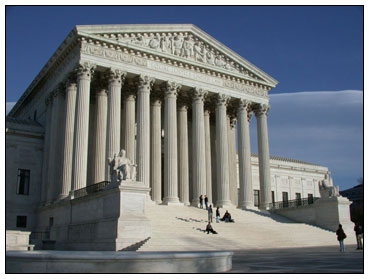Supreme Court rules in Double Jeopardy case
By: KIMBERLY ATKINS, BridgeTower Media Newswires//May 30, 2012//
Supreme Court rules in Double Jeopardy case
By: KIMBERLY ATKINS, BridgeTower Media Newswires//May 30, 2012//
 An informal vote taken by jurors before deliberations conclude and later reported to a judge in court does not amount to an acquittal, and therefore a retrial does not violate a defendant’s Double Jeopardy rights, the U.S. Supreme Court has ruled.
An informal vote taken by jurors before deliberations conclude and later reported to a judge in court does not amount to an acquittal, and therefore a retrial does not violate a defendant’s Double Jeopardy rights, the U.S. Supreme Court has ruled.
The case involved a defendant who was charged with capital murder in connection with the death of a 1-year old child. At trial, the jury was instructed to deliberate on the most serious charges, starting with capital murder, and then move on to the lesser-included charges until it reached a guilty verdict on a charge, or acquitted on all charges.
When the jury indicated to the judge that they could not come to a unanimous verdict, the judge summoned the jurors and asked how they voted. They reported that they voted unanimously against capital murder and first-degree murder, but could not reach a decision on the lesser charge of manslaughter. Because of this, they had not considered the negligent homicide charge. The judge sent them to back to deliberate longer, but the jury indicated that it was deadlocked and the judge declared a mistrial.
When the state sought to retry the defendant, he moved to dismiss the two most serious charges, arguing that he’d been acquitted by the jury and therefore a retrial on those counts would be unconstitutional.
The trial court rejected the motion and the Arkansas Supreme Court affirmed. The Supreme Court agreed to hear the case.
Affirming the state court, the Supreme Court held that Double Jeopardy did not attach because the jury’s report to the judge “was not a final resolution of anything.”
“When the foreperson told the court how the jury had voted on each offense, the jury’s deliberations had not yet concluded,” wrote Chief Justice John G. Roberts, Jr. for the 6-3 majority. “[T]he fact that deliberations continued after the report deprives that report of the finality necessary to constitute an acquittal on the murder offenses.”
Justice Sonia Sotomayor wrote a dissent that was joined by Justices Ruth Bader Ginsburg and Elena Kagan.
U.S. Supreme Court. Blueford v. Arizona, No. 10-1320.
Legal News
- The Latest: Supreme Court arguments conclude in Trump immunity case
- Net neutrality restored as FCC votes to regulate internet providers
- Wisconsin Attorney General asks Congress to expand reproductive health services
- Attorney General Kaul releases update at three-year anniversary of clergy and faith leader abuse initiative
- State Bar leaders remain deeply divided over special purpose trust
- Former Wisconsin college chancellor fired over porn career is fighting to keep his faculty post
- Pecker says he pledged to be Trump campaign’s ‘eyes and ears’ during 2016 race
- A conservative quest to limit diversity programs gains momentum in states
- Wisconsin prison inmate pleads not guilty to killing cellmate
- Waukesha man sentenced to 30 years for Sex Trafficking
- 12-year-old shot in Milwaukee Wednesday with ‘serious injuries’
- Milwaukee man convicted of laundering proceeds of business email compromise fraud schemes
WLJ People
- Power 30 Personal Injury Attorneys – Russell Nicolet
- Power 30 Personal Injury Attorneys – Benjamin Nicolet
- Power 30 Personal Injury Attorneys – Dustin T. Woehl
- Power 30 Personal Injury Attorneys – Katherine Metzger
- Power 30 Personal Injury Attorneys – Joseph Ryan
- Power 30 Personal Injury Attorneys – James M. Ryan
- Power 30 Personal Injury Attorneys – Dana Wachs
- Power 30 Personal Injury Attorneys – Mark L. Thomsen
- Power 30 Personal Injury Attorneys – Matthew Lein
- Power 30 Personal Injury Attorneys – Jeffrey A. Pitman
- Power 30 Personal Injury Attorneys – William Pemberton
- Power 30 Personal Injury Attorneys – Howard S. Sicula











